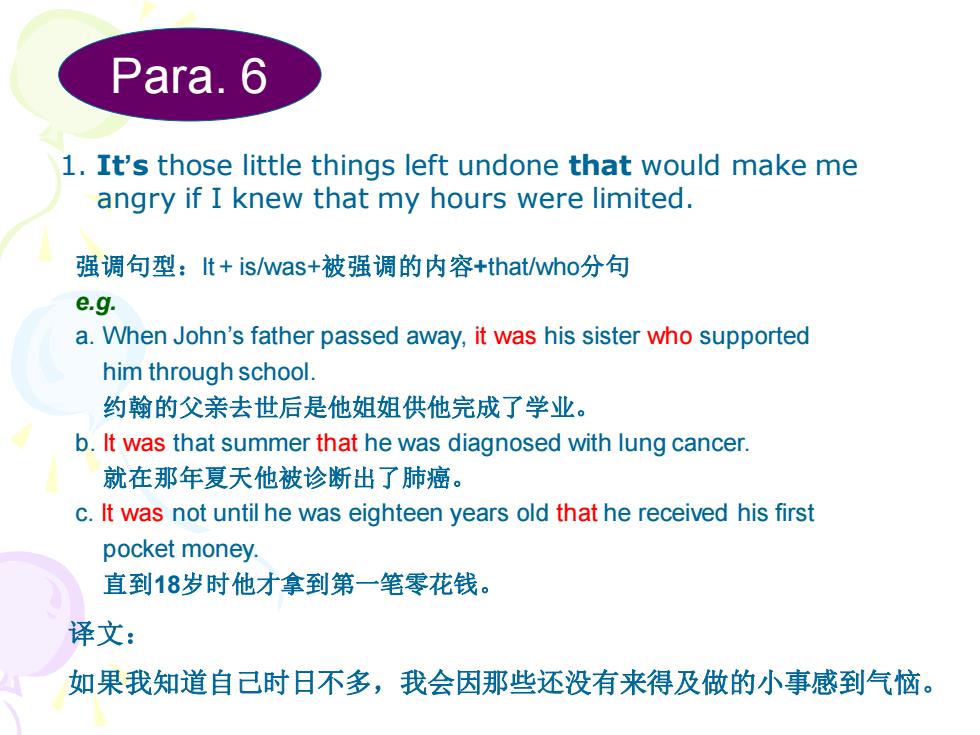
Para.6 1.It's those little things left undone that would make me angry if I knew that my hours were limited. 强调句型:t+is/was+被强调的内容+that/who分句 e.g. a.When John's father passed away,it was his sister who supported him through school. 约翰的父亲去世后是他姐姐供他完成了学业。 b.It was that summer that he was diagnosed with lung cancer. 就在那年夏天他被诊断出了肺癌。 c.It was not until he was eighteen years old that he received his first pocket money. 直到18岁时他才拿到第一笔零花钱。 译文: 如果我知道自己时日不多,我会因那些还没有来得及做的小事感到气恼
1. It’s those little things left undone that would make me angry if I knew that my hours were limited. Para. 6 强调句型:It + is/was+被强调的内容+that/who分句 e.g. a. When John’s father passed away, it was his sister who supported him through school. 约翰的父亲去世后是他姐姐供他完成了学业。 b. It was that summer that he was diagnosed with lung cancer. 就在那年夏天他被诊断出了肺癌。 c. It was not until he was eighteen years old that he received his first pocket money. 直到18岁时他才拿到第一笔零花钱。 译文: 如果我知道自己时日不多,我会因那些还没有来得及做的小事感到气恼
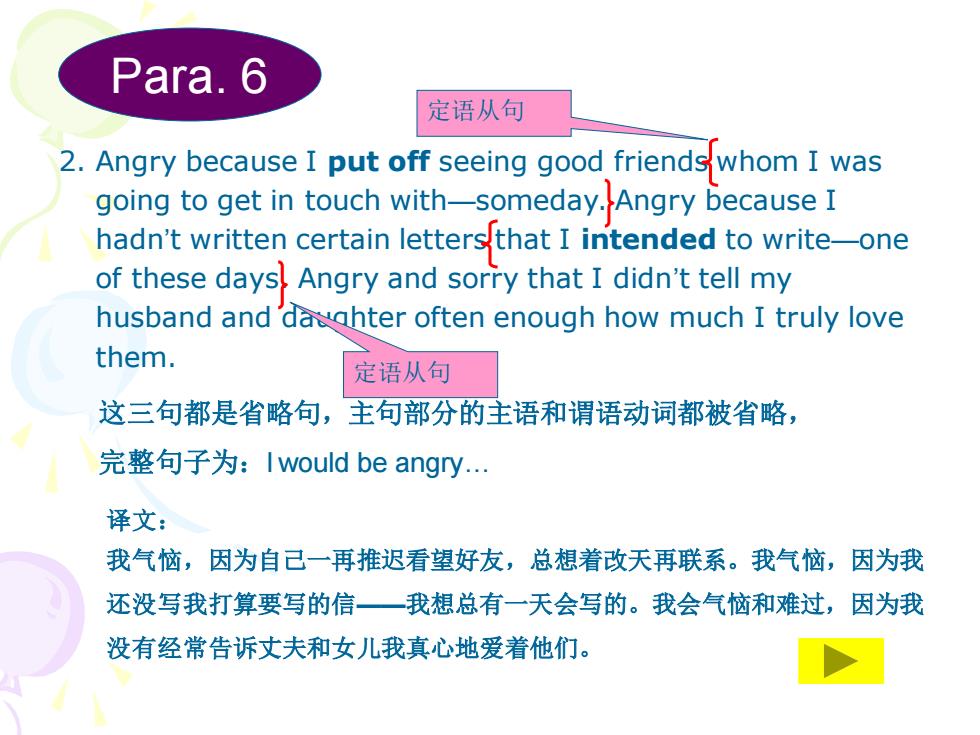
Para.6 定语从句 2.Angry because I put off seeing good friendswhom I was going to get in touch with-someday.Angry because I hadn't written certain letters that I intended to write-one of these days Angry and sorry that I didn't tell my husband and dauahter often enough how much I truly love them. 定语从句 这三句都是省略句,主句部分的主语和谓语动词都被省略, 完整句子为:I would be angry. 译文: 我气恼,因为自己一再推迟看望好友,总想着改天再联系。我气恼,因为我 还没写我打算要写的信—我想总有一天会写的。我会气恼和难过,因为我 没有经常告诉丈夫和女儿我真心地爱着他们
2. Angry because I put off seeing good friends whom I was going to get in touch with—someday. Angry because I hadn’t written certain letters that I intended to write—one of these days. Angry and sorry that I didn’t tell my husband and daughter often enough how much I truly love them. Para. 6 这三句都是省略句,主句部分的主语和谓语动词都被省略, 完整句子为:I would be angry… 定语从句 定语从句 译文: 我气恼,因为自己一再推迟看望好友,总想着改天再联系。我气恼,因为我 还没写我打算要写的信——我想总有一天会写的。我会气恼和难过,因为我 没有经常告诉丈夫和女儿我真心地爱着他们
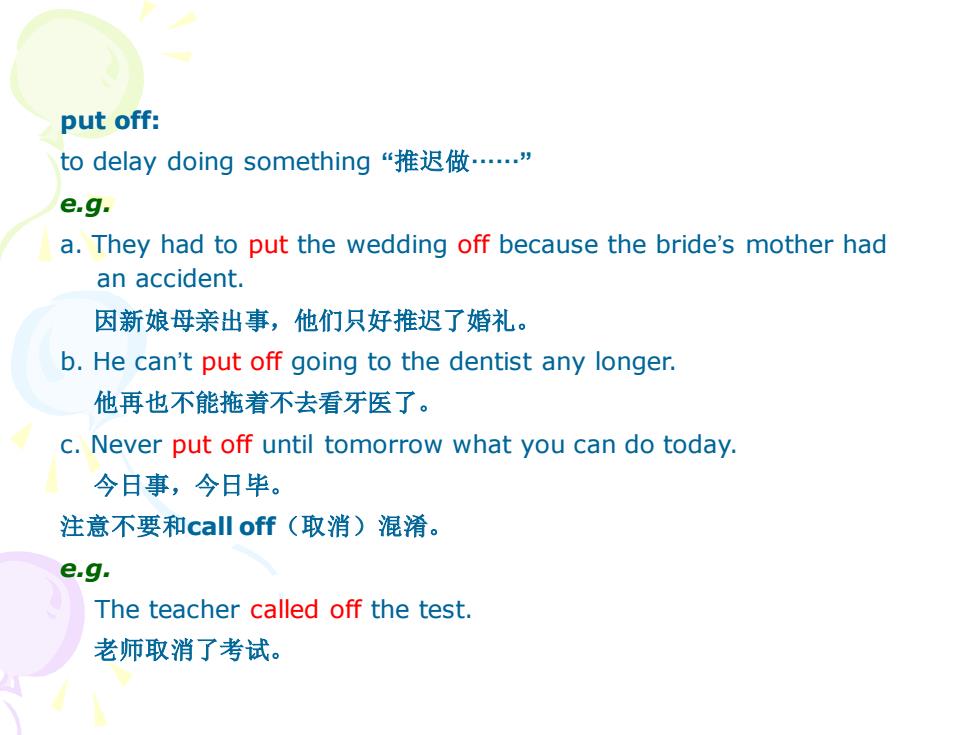
put off: to delay doing something“推迟做” e.g. a.They had to put the wedding off because the bride's mother had an accident. 因新娘母亲出事,他们只好推迟了婚礼。 b.He can't put off going to the dentist any longer. 他再也不能拖着不去看牙医了。 c.Never put off until tomorrow what you can do today. 今日事,今日毕。 注意不要和call off(取消)混淆。 e.g. The teacher called off the test. 老师取消了考试
put off: to delay doing something “推迟做······” e.g. a. They had to put the wedding off because the bride’s mother had an accident. 因新娘母亲出事,他们只好推迟了婚礼。 b. He can’t put off going to the dentist any longer. 他再也不能拖着不去看牙医了。 c. Never put off until tomorrow what you can do today. 今日事,今日毕。 注意不要和call off(取消)混淆。 e.g. The teacher called off the test. 老师取消了考试
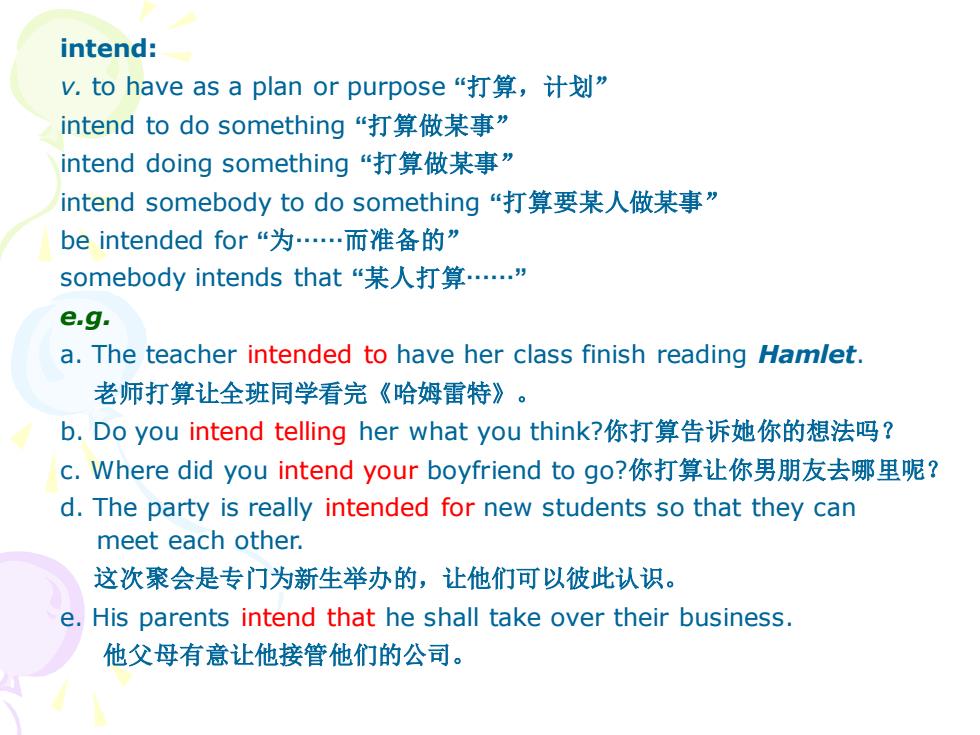
intend: y.to have as a plan or purpose“打算,计划” intend to do something“打算做某事” intend doing something“打算做某事” intend somebody to do something“打算要某人做某事” be intended for“为…而准备的” somebody intends that“某人打算.” e.g. a.The teacher intended to have her class finish reading Hamlet. 老师打算让全班同学看完《哈姆雷特》。 b.Do you intend telling her what you think?你打算告诉她你的想法吗? c.Where did you intend your boyfriend to go?你打算让你男朋友去哪里呢? d.The party is really intended for new students so that they can meet each other. 这次聚会是专门为新生举办的,让他们可以彼此认识。 e.His parents intend that he shall take over their business. 他父母有意让他接管他们的公司
intend: v. to have as a plan or purpose “打算,计划” intend to do something “打算做某事” intend doing something “打算做某事” intend somebody to do something “打算要某人做某事” be intended for “为······而准备的” somebody intends that “某人打算······” e.g. a. The teacher intended to have her class finish reading Hamlet. 老师打算让全班同学看完《哈姆雷特》。 b. Do you intend telling her what you think?你打算告诉她你的想法吗? c. Where did you intend your boyfriend to go?你打算让你男朋友去哪里呢? d. The party is really intended for new students so that they can meet each other. 这次聚会是专门为新生举办的,让他们可以彼此认识。 e. His parents intend that he shall take over their business. 他父母有意让他接管他们的公司
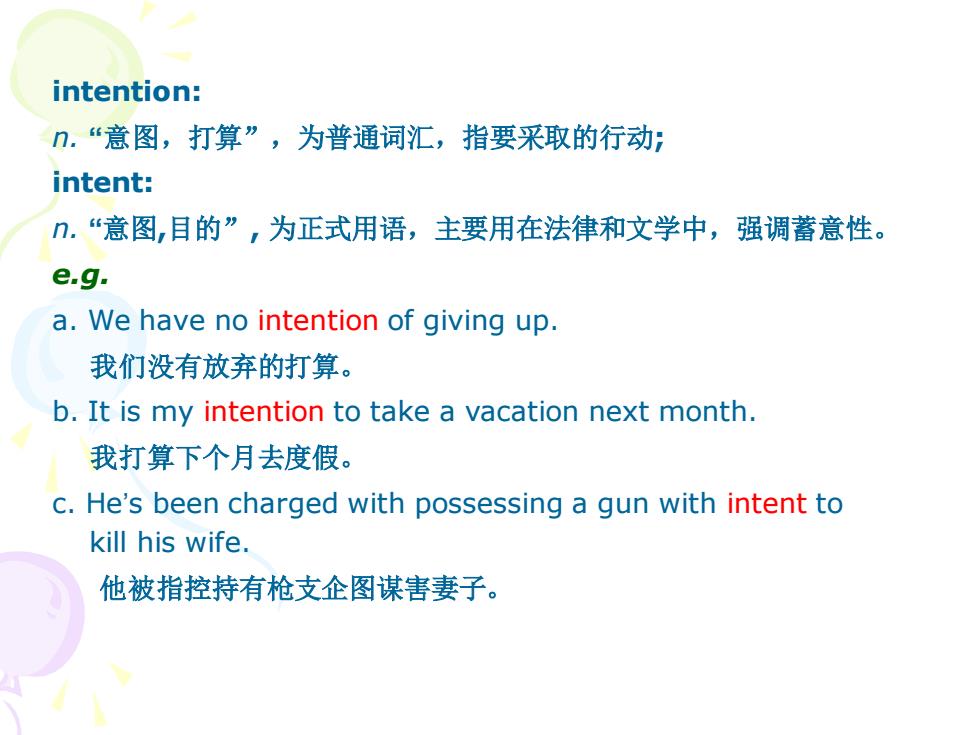
intention: n.“意图,打算”,为普通词汇,指要采取的行动: intent: .“意图,目的”,为正式用语,主要用在法律和文学中,强调蓄意性。 e.g. a.We have no intention of giving up. 我们没有放弃的打算。 b.It is my intention to take a vacation next month. 我打算下个月去度假。 c.He's been charged with possessing a gun with intent to kill his wife. 他被指控持有枪支企图谋害妻子
intention: n. “意图,打算”,为普通词汇,指要采取的行动; intent: n. “意图,目的” , 为正式用语,主要用在法律和文学中,强调蓄意性。 e.g. a. We have no intention of giving up. 我们没有放弃的打算。 b. It is my intention to take a vacation next month. 我打算下个月去度假。 c. He’s been charged with possessing a gun with intent to kill his wife. 他被指控持有枪支企图谋害妻子
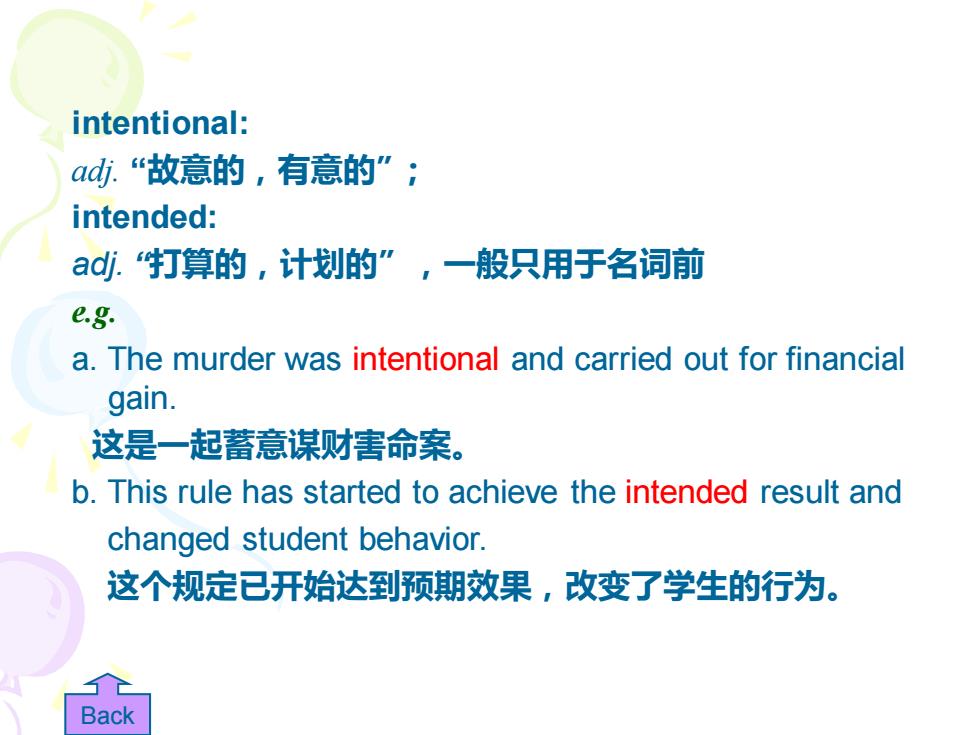
intentional: ad山“故意的,有意的”; intended: ad.打算的,计划的”,一般只用于名词前 e.g. a.The murder was intentional and carried out for financial gain. 这是一起蓄意谋财害命案。 b.This rule has started to achieve the intended result and changed student behavior. 这个规定已开始达到预期效果,改变了学生的行为。 Back
intentional: adj. “故意的,有意的”; intended: adj. “打算的,计划的”,一般只用于名词前 e.g. a. The murder was intentional and carried out for financial gain. 这是一起蓄意谋财害命案。 b. This rule has started to achieve the intended result and changed student behavior. 这个规定已开始达到预期效果,改变了学生的行为。 Back